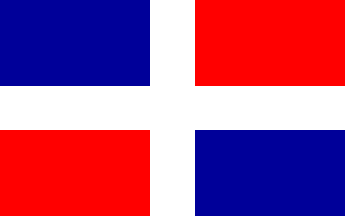
Last modified: 2006-11-04 by antónio martins
Keywords: cross (white) |
Links: FOTW homepage |
search |
disclaimer and copyright |
write us |
mirrors

The “merchant ensign” under the Constitution, which means (as
I understand it) that private citizens may use either version on land but
should properly speaking use the version without arms at sea.
Christopher Southworth, 12 Mar 2006
Civil ensign (as of 1939): This is one
of the five dominican naval flags in Flaggenbuch (1939-1941)
[neu39]. (The others are
war ensign and jack,
flag of the Generalissime
flag of rear-admiral, head of a flotilla and
admiral flag)
Ivan Sache, 10 Apr 1999
This flag design is often used instead of the proper national flag.
I think it results from a combination of what Emerson called a foolish
consistency, and trying to squeeze messy vexillogical realities into our
artificial pigeonholes. The general policy seems to be that when a nation
has what we teem both a civil flag and a state flag, we give precedence
to the civil flag. That seems to work work well enough when we are dealing
with European nations, since their citizens seem in general to also regard
the civil flag as the deafault "national flag". However, this policy is not
at all appropriate for most Latin American nations. The exact boundaries
between “civil” and “state” flags, their respective usages, and
their connotations do not seem to be precisely the same in Latin America as
in Europe. From what I can observe, it seems most Latin Americans regard the
“state” flag rather than the “civil” one as the
“national flag”.
Ned Smith, 29 Mar 2004
The diferences in overall ratio are
similar here as to the national flag.
Željko Heimer, 16 Jun 2001
Anything below this line was not added by the editor of this page.